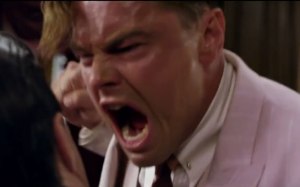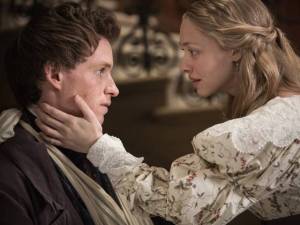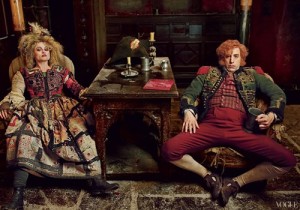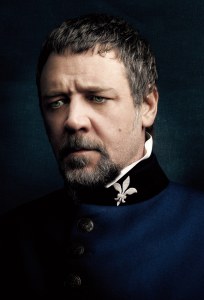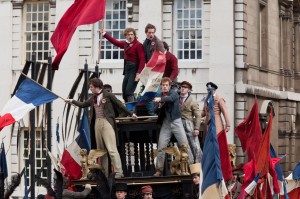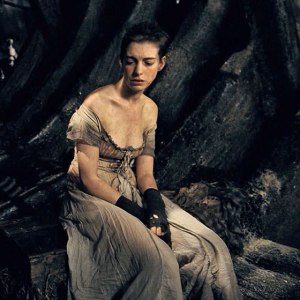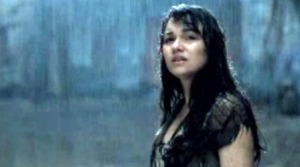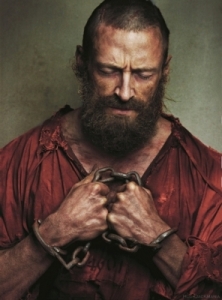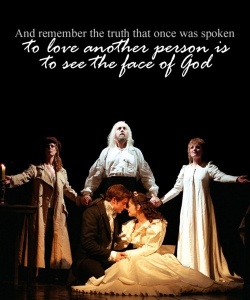BY RACHEL
Guess Who’s Back… back again… Rachel’s back. Tell your friends!
From this you should be able to tell several things:
1 I have been listening to too much Eminem…
2. SCHOOL’S OUT FOR SUMMER!
3. I have started watching movies again.
Specifically Baz Luhrman-y things. My excuse is that my 9th and 10th graders finished out the year with two books (semi)recently adapted by Baz Luhrman into melodramatic and overblown, but (occasionally) well-acted misinterpretations: Romeo and Juliet and The Great Gatsby.
I suppose I should get several things out of the way. I do not hate either of these movies. I don’t mind updating Shakespeare with modern settings and cut lines, so long as the themes remain intact. I like anachronistic soundtracks. I think Luhrman’s interpretation of Mercutio’s “Queen Mab” speech as a statement that Romeo’s type of love is a drug (pre-Ke$ha) is interesting. I think that Gatsby is spectacularly well-acted. I adore the complete lack of the shaky camera that keeps invading movies that I otherwise enjoy. I even kindof like the fact that Luhrman’s movies tend follow this sequence:
1. Cool-filtered and melancholic opening scene foreshadowing the DEPRESSING end of the story by having an angsty narrator look back on the events of the movie.
2. 20 MINUTES OF JUMPY-CUT-BUT-SMOOTH-CAMERA, PSYCHODELIC, FRENETIC, OVERBLOWN, AND ULTIMATELY POINTLESS PARTY SCENES!
3. Sudden shift to the sentimental love-story, marked by slow motion eye-contact and suddenly gentle soundtrack (R and J: Kissing You; Gatsby: Young and Beautiful).
4. Hour and a half of escalating sentimentality, which can only mean Doomed Love (Note the capitalization!)
5. Sad ending, endeavoring to leave the audience somber but not requiring any alteration in their actions, behavior, or lives.
(By the by, just a reminder, I am writing for people who have seen the movies and/or read the books. If you haven’t, either stop reading or prepare to be thoroughly spoiled. YOU HAVE BEEN WARNED!) This brings me to my actual problems with the movies.
MOVIE THOUGHTS: Romeo + Juliet
At first I was going to write one monster post on both of these, after all: both movies are by Baz Luhrman, starring Leonardo DiCaprio, underscored by interesting/poppy soundtracks and guilty of parallel misinterpretations! However, I found I had too many thoughts. Sorry!
Let’s get the ball rolling: ROMEO AND JULIET IS A TRAGEDY! Not just because the main characters die. Tragedy is NOT EQUAL to sad. Tragedy is a single unified drama in which we are invited to consider the nature of human character and fate by witnessing the fall of a noble character because of a fundamental ignorance which leads to a transgression act. It is sad, but the goal of the story is not just to have all of the sad feels. We, as an audience, are to purge ourselves of the toxic emotions in order to better consider the moral implications of our choices.
The great danger, to which most modern interpretations of Romeo and Juliet have fallen prey, is taking this as Shakespeare prefiguring Nicholas Sparks.

i.e. He wrote about “perfect” but depressing love between teenagers whose story ends in death but only because of the general badness of the world (be that badness cancer, mean people, Alzheimers, or feuding parents.)
Pardon my french in advance: This is a load of horse shit. Let Shakespeare be the new Sophocles or Aeschylus. LET HIM NEVER BE BLASPHEMED AS THE OLD NICHOLAS SPARKS! Alright, I am calming down. But seriously folks, we must not think of Romeo and Juliet this way. Not to contradict Taylor Swift, but this is NOT a Love Story.
To explain this, I am going to start at the very end. A very weird place to start.
In Shakespeare’s version, we do not have the return of a chorus to tell us the social significance of the play or how we ought to feel. The final lines of the play are the Prince, the civil authority, saying:
A glooming peace this morning with it brings;
The sun for sorrow will not show his head:
Go hence and have more talk of these things;
Some shall be pardoned, some punished:
For never was a tale of more woe
Than this of Juliet and her Romeo.
This closing is a command: Go. Think. Talk. Judge. We are asked not simply to say “Gee, that was really sad,” but rather to consider who deserves pity or scorn (pardon or punishment) for the horror at the end of this play. Moreover, we are pushed to consider the degree to which they deserve pity or scorn. Sorrow is not the object of this lesson; it is the means by which we are pushed to judge – not only the choices of the characters but our own.
That’s Shakespeare.

You fabulous genius, you!
Then there is Baz Luhrman.

Tragedy…. I do not think that means what you think it means…
Superficially, we might say that the ending of the movie is the same. Except it isn’t. And if you have read the book, YOU SHOULD NOT STOP THINKING AT LUHRMAN’S INTERPRETATION. GO. TALK. THINK. JUDGE.
So. What is different?
1. Paris doesn’t die. Specifically Romeo does not commit that much less pardonable murder. We’ll come back to that.
2. The Prince has the penultimate, not the final, line. And it is changed. Instead, he screams into the camera:
“ALL ARE PUNISHED! ALL ARE PUNISHED!”
3. The actual last two lines are delivered by the televised talking head who serves as Luhrman’s chorus.
What effect is brought about by these TINY alterations?
1. Romeo (and Juliet) are more pitiable. I will come back to that.
2. The civil authority does not judge each according to their actions, rather ALL are punished. Consequently, we as the audience have no homework. The characters have been weighed and EVERY single one of those still living has been found wanting. Case closed.
3. The chorus (who first gives us the idea of the “star crossed lovers” … I.e the poor but idealized teenagers whose “perfect love” was just RUINED by fate and their families) has the last words. And those words are…

BE SAD!
This is the problem with Baz Luhrman’s Romeo + Juliet. He takes away the moral power of a tragedy by presuming the goal of a tragedy is simply sorrow, when in fact, the goal of a tragedy with all of it’s dramatic irony, emotion, transgression, failing, (and yes, even sadness) – is to MAKE US ABLE TO SEE RIGHTLY AND MORALLY.
So, because you are all super nice (if you have read this far) I am going to list (hopefully quickly) my observations as to the actual moral problem presented by Shakespeare.
The transgressions in Romeo and Juliet can be condensed into the failure of understanding the role and responsibilities of vocations.
Vocational Duties in R+J and how they are ABANDONED!
1. Civil/ Political Vocation
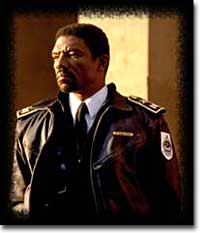
THE PRINCE
The Prince, as civil authority, should have stopped and seriously punished this feuding long before this point. Failure to punish and protect is failure indeed. His vocation calls him to the care of his city and its citizens. Because he fails in his civil vocation, there is a vacuum. Someone must restore civil order, presenting an occasion of sin for Friar Laurence.
2. Religious Vocation

FRIAR LAURENCE
Friar Laurence is a priest, specifically he serves as confessor and pastor to the entire town of Verona. His vocation is the care of souls. Yet, because of the “civil strife making civil hands unclean” he abandons this responsibility, starting with his very first scene.
After meeting Juliet, in Act III, Romeo comes tearing into Friar Laurence’s cell gushing about this NEW perfect beloved – Juliet. (This entire act, by the way is Shakespeare calling attention to the fact that Romeo is falling so fast that everyone he meets spends the first have of the interaction assuming that he is gushing about his former infatuation, Rosaline.) Friar Laurence at first says EXACTLY what he ought to. He instructs Romeo in the correct ordering of affections, the fact that his love for both Rosaline and Juliet are mere idolatrous imitations of love. He counsels and counsels well.
Then, he says the following fateful lines:
But come, young waverer, come, go with me,
In one respect I’ll thy assistant be;
For this alliance may so happy prove,
To turn your households’ rancor to pure love.
On the face of this, it is easy to see the good in this. Friar Laurence will use Romeo and Juliet’s loving infatuation to form an alliance between these two warring families and restore peace to Verona.
Did it bother anyone that I just said a priest is going to use (coughSTUPIDcough) teenage infatuation rather than reorder and heal it?
It is a PROBLEM that a Friar is setting aside his vocation to the pastoral care of soul. This failure and abandonment is made more concrete in the last act when Friar Laurence (for fear of the fast approaching civil authorities) abandons a drugged, distraught Juliet in a tomb, pinned down by the corpse of her husband. To some degree, the blood and soul of this child is on his hands.
3. Parental Vocation

THE NURSE
He is not alone in his act of abandonment. All of the parental figures of this play similarly abandon – morally and/or physically. Their vocation to the care and guidance of children, protecting and restraining when necessary.
First, Juliet’s Nurse, in her hurry to approve of everyone, encourages Juliet not only to imprudence, but even to bigamy. She calls everyone she meets “good and wise and virtuous.” Again, this is not in and of itself a problem. After all, isn’t it good to see the best in people?
Except that her want of right judgment deprives Juliet, a 13-year-old girl, of any guidance. Much as we may want all choices to be equal and equally good and wise and virtuous, they are not. In failing to guide Juliet, she essentially morally abandons her.
Second, Juliet’s parents do more than essentially abandon her. They actually do it. When she is reluctant to marry Paris (because she is already married.) Her father vows that he will give her to his friend or cast her out into what ever form of harlotry she wishes. Her mother then refuses to even speak to her.
While I am not saying that Juliet is purely innocent of her suicide, I will say that Shakeapre makes an awfully big deal about how young she is – even for “the olden days.” She is still clearly in need of love, protection, and judicious guidance. This is what parents and guardians are CALLED to provide. She receives none.
4. Marital Vocation.

ROMEO AND JULIET
This brings me back to my initial point. Romeo and Juliet is not a Love Story. It is an Idolatry Story. By idolizing one another, Romeo and Juliet fail in the vocation of marriage — the care of the soul of the beloved .
Marriage is not eternal. It has a finish line: Till death do us part. This should not be a sad statement. The point of marriage is not the forever fluffy feelings. Marriage is the vow (of man, wife, and God ) that you will push, pull, and carry your beloved to the perfection and completion of Love Himself in heaven. Marriage is not necessary in heaven.
In the romance of these two children, Shakespeare provides a reminder that our world needs more than ever, showing what this idolatrous erotic love looks like from origin to symptom to inevitable result.
How does it happen?
Juliet falls into idolatry (as teenager girls are wont to do) for the lack of protection. Romeo, on the other hand, arrives at idolatry by refusing wise counsel.
In short, the problem with idolatry is that it makes the universe too small. Instead of a universe created by and governed by an infinite and eternal Love, idolatry limits the world to whatever can be governed by something smaller.
Making an idol of another person begins with limiting our vision of reality and ignoring any signs or counsel that calls to and indicates a higher and wider world.
What does it look like?
Idolatry, because of the blinders it requires, looks like infatuation. It is the exact “us agains the world” mentality. Because of this, I would argue that the only thing that comes close to the religious wars our world has witnessed is the emotional war between a besotted teenager and his or her parent. This is because this love is not rightly ordered. It is not leading toward God and eventually family.
Where does it end?
In suicide. Heaven is abiding in the complete presence of and union with God. If Juliet is god, then Verona (specifically marriage to Juliet in Verona) is heaven. Hell is irrevocable separation from God. If Romeo is banished from the presence of his god, Juliet, then he is in hell.
In making a mortal person into God, suicide is the only logical conclusion. If you are already in hell, why should death and subsequent separation from a God in whom you do not actively believe make any difference?
Ok. That was really long. SORRY!
Basically, here is what I got. Luhrman’s Romeo + Juliet is dangerous, not because he is willfully leading children astray into idolatrous and unhealthy loves. However, this movie is guilty of the very same transgression as the adults in Shakespeare’s play: a failure to care for the formation of the loves and souls of the young. Similarly, under the supposed guidance of this, more children are guilty of confusing idolatry with love. (TWILIGHT. TAYLOR SWIFT. ETC. ETC. ETC.)










